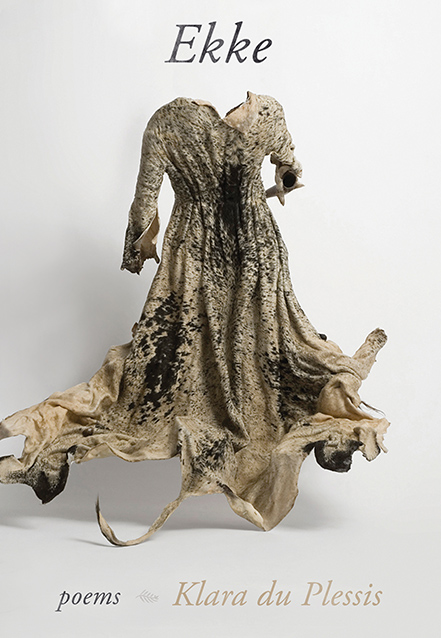
Klara Du Plessis
Ekke
Palimpsest Press
Review by Anna Geisler
Even our finite world is brimming with choices, possibilities, transformations—this struck me as the main tenet in Klara du Plessis’ debut collection, Ekke. Her resonant poems, influenced by landscape, place, the body, and art, explore the exciting and multitudinous influences that act upon us in this seemingly concrete world.
Dividing her time between Montreal and Cape Town, and writing predominantly in English, the poet travels between multiple languages and geographies in the eight lyric poems that make up the collection. This is evident as early as the title, Ekke, “a dialectic, emphatic form of ek, denoting the first person singular in Afrikaans.”
In “First of All We No Longer Write in Black,” she navigates through both language and physical space:
Skip
words over the landscape
as it were
a lake.
Confusing when lake is meer in Afrikaans
but mer is sea in French but See is lake in German
and meer is more
and See is sight.
The title also establishes one of the collection’s main themes: the search for identity and the discovery of self, as the poet works to “eke / out a meaning for [her] self.” Through the breadth of the poet’s probing vision, we witness identity not as fixed and determined, but as something more fluid, changeable. The speaker veers away from absolutes and towards a more complex understanding of the self, which is elaborately woven together from her myriad influences.
And it’s not only the speaker’s identity that is malleable and multitudinous. Delightfully, her surroundings prove equally capable of surpassing the limits of their established definitions. Sexuality melds with art; art melds with language; language melds with nature. “First of All We No Longer Write in Black” speaks to the nature of identity through the recurring image of stones:
Each name constructed with multiple stones.
Each name
broken down to rocks
the size of two grasping hands.
The rocks
handpicked, transported, tinted,
laid to rest in the shape of a name.
Multitudinous,
the name expresses itself only in plurals,
always exaggerations.
Repurposed, repatriated,
stones estranged in new names.
In “Ceiling Roses,” the purpose of a vase is questioned as it becomes a space for everything but flowers:
Flour ashes
Dissensions
Negative space
Not for naught
The inner narrative of an urn
And, my favourite lines from “Conveyor Belt”:
[I want to conjugate the cow.
I
Io
Isis]
There’s so much at work in this small section of the poem. The cow surpasses the boundaries of nature and enters the space of language, then undergoes a series of transformations—first into the pronoun, I; then into Io, a priestess-turned-cow by the goddess Hera in Greek mythology; and finally, into the goddess Isis—completing its full transformation from animal (physical) to divinity (spiritual). What’s more, the brackets literally contain the words of the poem—echoing the way in which even the finite is, in a seemingly contradictory way, filled with infinite possibilities.
But perhaps even more than they search for identity, the poems in the collection work to earn a sense of autonomy—both for the speaker and the world she inhabits. The speaker, at once art and artist, takes an active role in sculpting her own identity.
I eke
out a meaning for my self.
Ek
Ek
Ek
Ek
Ek
Ek
…
It is the K in my name that saves me.
K in me ek
C is meek.
There are certain associations I harbour against Clara
…
The perfect equilibrium, when she
lowers her eyes it is modesty, when I
fail in eye
contact
it’s a skittishness, a fault.
Language too is given a life of its own, and the right to change according to its own needs. The speaker warns: “if you manhandle language, like other things, it cowers.” Flowers are given control over their own fate, and “hold moisture firmly between thumb and index.”
In this striking debut, Klara du Plessis traces an existence that is at once defined and mysterious, fluid and concrete. In a world of binaries—emotion and intellect, delicacy and firmness, the ephemeral and the concrete—her poems are small stones skipping across water.
Born in Konin, Poland, Anna Geisler is a Toronto-based poet and a recent graduate from Pacific University’s MFA program. Her poems have been published in numerous journals in Canada and the United States, most recently Nine Mile magazine and Juniper Poetry Journal. “I Am Trying to Evaluate a Girl Running Laps Around a Basketball Court” has been nominated for the AWP Intro Journals Project.